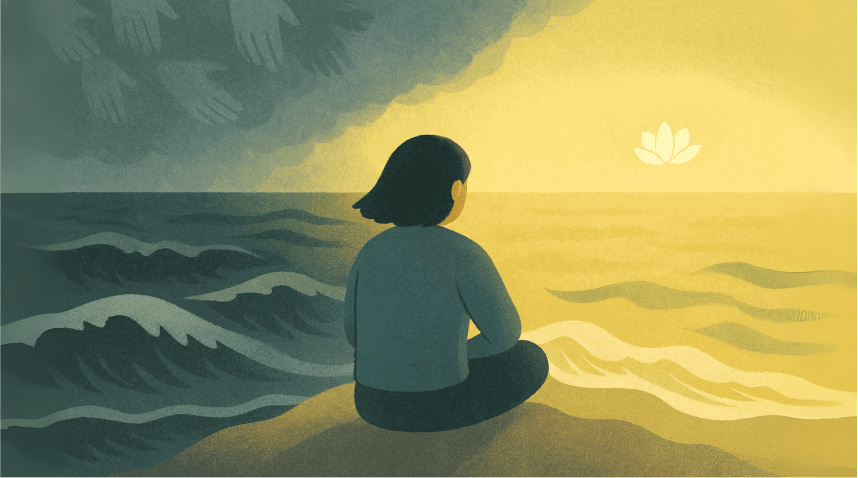TLDR: After a deep personal loss and a spiral into depression, the author found comfort through friends and therapy. However, lasting purpose only emerged after encountering Buddhist teachings through a meditation retreat. With support from a spiritual community and wise teachers, the journey of recovery began — one guided by compassion, patience, and the recognition of impermanence.
It’s likely this isn’t your first time reading an article about the profound effects of Buddhist teachings (it is the whole premise of this site, after all!). In line with HOL’s Mental Health Month, here’s one more to add to the collection — written in hopes that this story brings you comfort and reminds you that you are not alone in your struggle.
To begin, I wasn’t particularly religious growing up. I held certain stereotypes about traditional religions — seeing them as ritualistic and often at odds with science. I didn’t consider myself spiritual either; absorbed in worldly pursuits, I never explored anything deeper.
My only touchpoint with Buddhism was a rudimentary understanding of kamma, which gave me comfort during a particularly powerless moment in childhood.
When Grief Took Everything Away
Two years ago, someone very dear to me left, and the grief brought me to my knees. Things that once brought me joy or purpose suddenly felt hollow. Everything seemed frivolous and futile. What was the point of doing anything if everyone I loved would leave one day anyway?
Nihilism took over, and my world collapsed.
In the weeks that followed, I woke up every day wishing I hadn’t, as I was constantly dragged under a relentless tide of anxiety, guilt, depression and regret from the moment I opened my eyes. I cried for hours, and would be so drained that even basic self-care, like showering, felt very difficult.
I’d only ever get out of bed for some food, water or the toilet.
The pain, loneliness, and self-loathing were unbearable — so acute and exhausting that I could barely function. It felt like there was no end in sight, and I wanted so badly for it to stop. Desperate to escape those feelings and clouded by depression’s distortions, I began planning a permanent escape.
The First Glimmers of Support
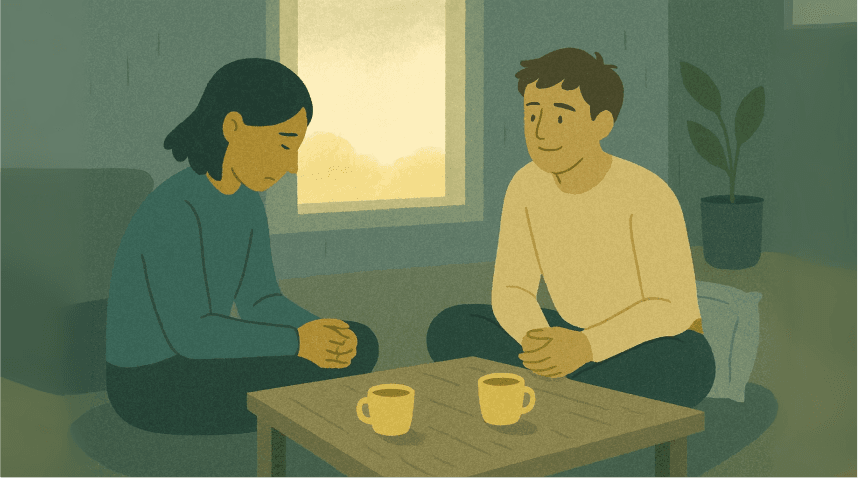
No one around me knew what I was going through as I kept to myself. I knew I would only be able to get the help I needed if I reached out, hence I eventually confided in a few people I trusted. I made plans to meet and sob talk with them, which also forced me out of the house (more importantly my bed). They listened and kept me company, providing the respite I desperately needed. But it was temporary.
In moments alone, I fell right back into the spiral.
I went through the motions of life feeling dreadful and devoid of purpose as days blurred into weeks.
Then, one day, my mother — who never pushed religion — asked if I wanted to join her at a Buddhist meditation retreat. I hadn’t expressed interest, but with my calendar now empty, I said yes.
With two weeks left before the retreat and almost no knowledge of Buddhism, I dove into a crash course: Bhikkhu Bodhi’s videos, scattered online resources, anything I could find. The retreat turned out to be a pleasant experience.
A change in routine quietened the noise in my head, even if just a little.
A Story That Changed Everything
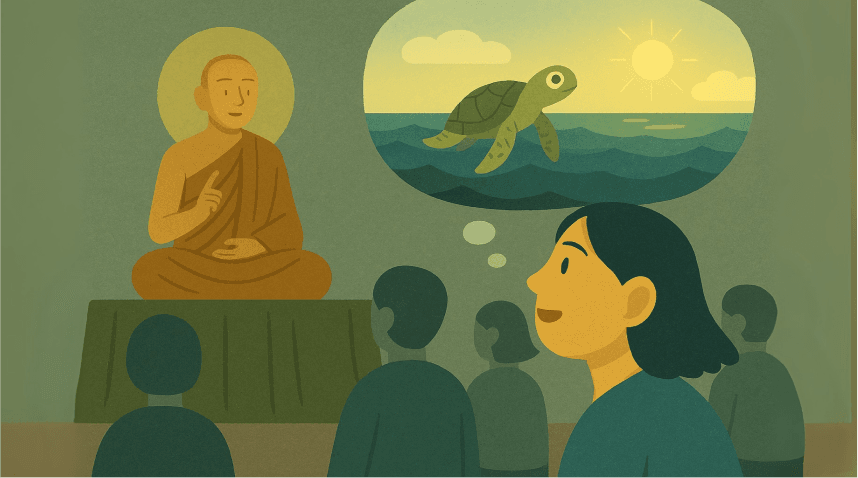
The turning point came during a Dhamma talk, where the teacher shared the parable of the one-eyed turtle that surfaces once every thousand years (SN 56.48). The story hit me hard — the rarity of human rebirth, and even more so, the rarity of encountering the Buddha’s teachings.
For the first time in a long while, I felt grateful to be alive as my perspective shifted.
It dawned on me: there’s no guarantee I’ll have these same conditions in a future life — no certainty of being human, or finding the Dhamma again. As the Ajahn urged us to make haste in getting as close as possible to the door of Nibbāna in this very life, I made up my mind to practise well and not waste my blessings.
After months of existential nihilism, I had finally found meaning and purpose. I was no longer in a rush to leave this life behind. The retreat also introduced me to DAYWA, an invaluable community of spiritual friends who have anchored me ever since.
Burnout and Relapse
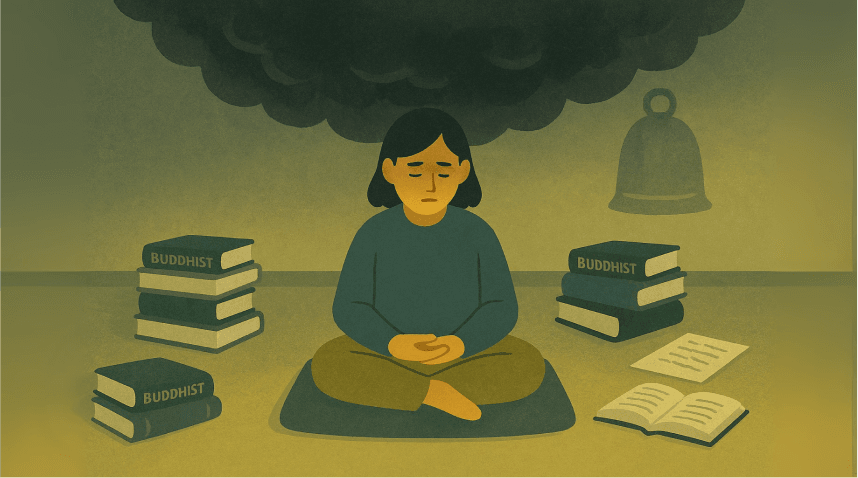
Of course, this wasn’t one-and-done. Inspired by the retreat, I dove headfirst into Buddhist books and meditation — only to burn out when progress felt slow or nonexistent. Sometimes, things even felt worse.
I quickly slipped back and found myself still very much shrouded in the dark cloud of depression.
Between my relapses and frequent visits to my psychiatrist and psychologist, I’d turn to my close friends when I felt overwhelmed. Soon enough, I noticed I was repeating myself, and felt like a nuisance despite their reassurance.
I went back to my old pattern of bottling things up, and it was a tumultuous period, made even more turbulent with the passing of my grandmother as well. Eventually, I threw myself into work to feel better about myself, as I found it easier and quicker to seek that validation and gratification that I hadn’t yet achieved in meditation.
Meeting a Teacher Who Saw Through Me
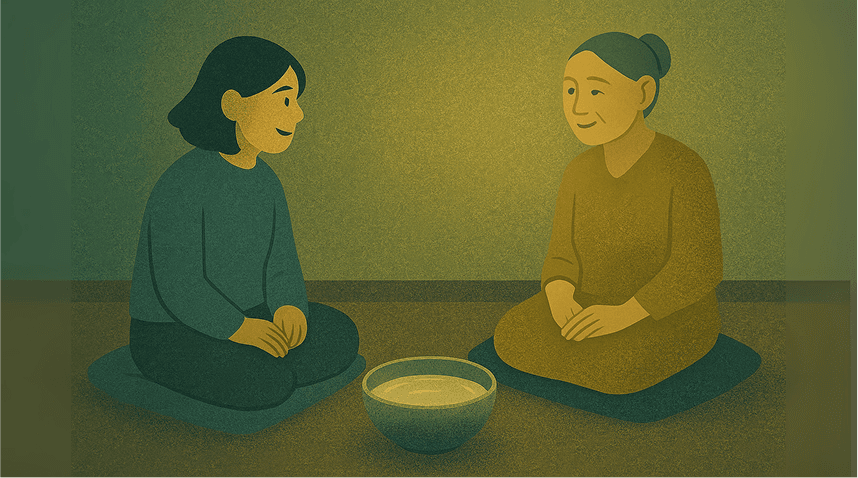
Months later, through the compassion of a DAYWA leader, I was given the rare chance to speak privately with a wise, well-practiced teacher. Her remarkable ability to see through people made me feel deeply vulnerable — there was no hiding from her. As long-suppressed pain resurfaced, her gentle wisdom helped me navigate through it.
Much like muddy water that remains murky when constantly stirred, clinging on to saṅkhāra agitated my mind too frequently. Without a chance for its contents to settle, the swirling emotions seemed permanent.
She guided me to focus on the cessation of pain rather than its onset, so I could witness its impermanence. Just as sediments in the water settle to the bottom with time when undisturbed, these thoughts and emotions would eventually subside when one leaves them be.
“Nature is helping you — let it help you.” she said.
While it was scary and easy to be swept away by the strong currents of sentiment, I had to trust that nature would take its course. Thoughts and emotions, however strong, would pass, just like waves crashing in and then retreating.
In a previous conversation with her, she had also pointed out my stubbornness, saying I wouldn’t have stumbled onto this path if I hadn’t suffered so deeply (which, in hindsight, is very true). That comment gave a new meaning to my struggles. I began to frame it as a sort of “canon event” or origin story of a protagonist (think Spider-Man: Across the Spider-Verse — IYKYK). It helped me shift from victimhood to something a little more light-hearted and empowering.
Looking back, I was incredibly fortunate to have support from family, friends, colleagues, and access to professional care. It was the hardest blow dealt in the softest way possible; hard enough to knock me down so that I’d look for a way out of suffering, but cushioned by the surrounding support so that I still had a chance to get back up.
Learning to Be Patient With Healing
These days, I take a more balanced approach to deepening my knowledge and practice. Slowly, I’m building a new identity — one not defined by the person who left me. No doubt I still have bad days, slight triggers and anxiety about associated topics, people, places and memories. The fear of relapsing hasn’t fully gone.
But now, I do my best to extend compassion to myself. I try to be patient, allowing myself to move at my own pace instead of beating myself up for taking “too long”. Armed with the Buddha’s teachings, and flanked by my support system, and compassionate kalyāṇamittā, I find the courage and strength to pick myself up and try again — one day at a time.
Wise Steps
- Be kind to yourself during difficult times.
Recovery is not linear. Avoid berating yourself for being stuck or moving slowly. There’s no fixed timeline for healing. - You are not a burden.
It’s okay to reach out to others. Expressing vulnerability and seeking help are not signs of weakness, nor are they things to feel guilty about. Leaning on your support network is a valid and important part of recovery. Prioritise getting better — you can pay it forward when you’re ready and within capacity. - Seek professional help.
Therapists, psychiatrists, and support groups play a vital role. Sometimes, these challenges require guidance and support beyond what we can achieve on our own. Reaching out to a qualified professional can give us the necessary tools and strategies to navigate these complex issues. - Reframe your suffering.
Changing the narrative can empower you. Whether through gratitude, compassion, or even humor, new perspectives can turn victimhood into resilience. - Have faith in impermanence.
Emotions, thoughts, and pain are like waves — they arise and pass. Trust that, with time and stillness, clarity will return.

